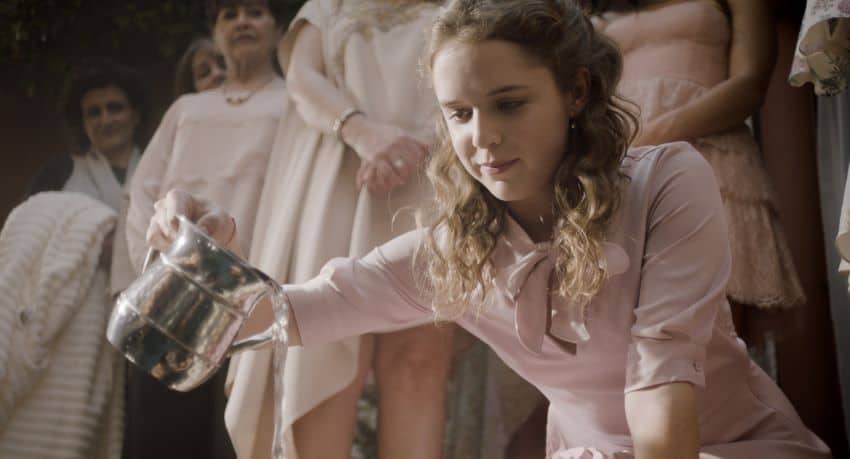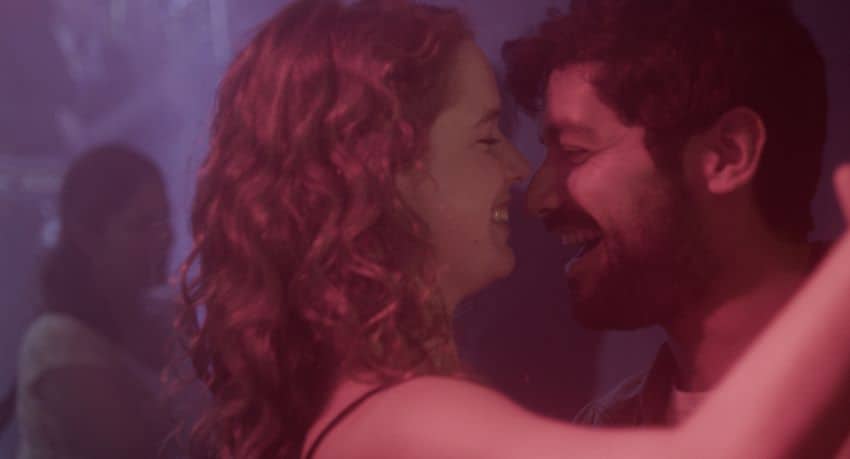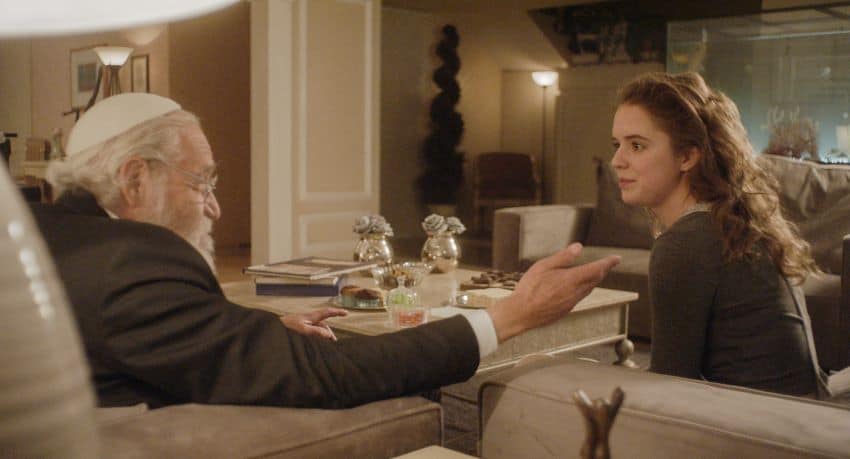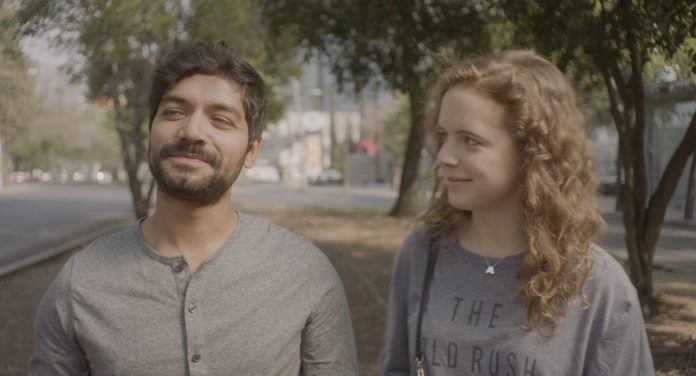Offering a rare cinematic look at a historic Mexican Jewish community, the new feature film Leona is a deeply personal subject for its director, Isaac Cherem.
A native of Mexico City, Cherem grew up in the Syrian Jewish community, which dates back to a mass migration from the Ottoman Empire over 100 years ago. His influences include the French New Wave as well as the late Korean director Kim Ki-duk and American independent filmmakers Miranda July and Jim Jarmusch. Another influence is Woody Allen, including the film Hannah and Her Sisters with its family dinner-table get-togethers that resonated with Cherem, who remembers numerous such occasions from childhood.
Set in the present day, his debut film Leona tells the story of a fictional member of this community, a young artist named Ariela who falls in love with a non-Jewish writer named Iván. Their romance encounters resistance from Ariela’s family and community, who fear that she will marry outside her religion.
The film opened in theaters and on-demand on February 5. Before that, it made the film festival run for several years, during which time Mexican actress Naian González Norvind, who plays Ariela, won a best actress award from the Morelia International Film Festival. González Norvind’s mother is famed telenovela star Nailea Norvind.
Cherem worked with Nailea Norvind as an assistant director on a film project while in his early 20s. He describes her as “at one point … probably the most famous actress in Mexico” and “willing to do anything for the sake of art.” They became friends, and he met her daughter. When Cherem asked González to be in his directorial debut film, she agreed not only to star in it but to cowrite the screenplay with him.

Cherem originally intended Leona as a Romeo and Juliet story, calling it “impossible love” or “a basic romantic comedy.” After González joined the film, they teamed up for something different. “[The] relationship was not the center of the story, the center of the story is [Ariela’s] coming-of-age,” Cherem said. “Our story was about her becoming an adult, making her own decisions.”
It echoed Cherem’s real-life journey. He described his anger at expectations for him to marry within his community, have a large family and follow a business career. Instead, he said, “I wanted to be an actor and do films.”
He moved out of his parents’ house and went to film school in Los Angeles. There he realized he did not know much about his homeland or “what it means to be Mexican.” Eventually, Cherem decided to create a film that would reflect his interest in Mexico as well as the community he had grown up in.
Cherem filmed scenes of life in some of the Jewish neighborhoods of Mexico City, such as Bosques de las Lomas. Other scenes were shot in neighborhoods such as Roma and Coyoacán. In addition to stars González and Christian Vázquez (who plays Iván), Cherem recruited his parents and a local Kabbalah teacher for the cast. He said that Mexican Jews have received little attention in the national cinema, save for a handful of films, such as Novia que te vea and Morirse está en hebreò. Leona, Cherem said, represents the first Mexican cinematic treatment of the country’s Syrian Jewish community.
The community is rooted in two historic Middle Eastern cities: Aleppo and Damascus. Members with ancestors from Aleppo are referred to as halabi while those having Damascus roots are known as shami. Cherem’s father’s family is originally from Aleppo while his mother’s side has roots in Damascus. Both cities were part of the Ottoman Empire when Jews began migrating from there in the early 20th century.
“As local conditions became more undesirable, [they could find a] new life in the Americas,” said Dalia Wassner, director of the Project on Latin American Jewish and Gender Studies at the Hadassah-Brandeis Institute of Brandeis University. This became especially important “with the collapse of the Ottoman Empire,” she said.

Some went to the United States or Argentina. But by the 1920s, the U.S. closed its doors to immigration.
“For some, proximity to the U.S. was an attraction, even if they ended up ultimately staying in Mexico through the generations,” said Wassner, who presented Leona in Boston when it was shown by the National Center for Jewish Film in 2019.
Mexico’s Jewish community is now the 14th-largest in the world with between 40,000 and 50,000 members.
“They report very little intermarriage,” Wassner said. “Among the Syrian community, there’s a lower intermarriage rate, almost zero.”
When the film opens, Ariela is living with her divorced mother, Estrella, in Mexico City. Estrella looks to date available Jewish men and encourages her daughter to do the same. Ariela’s life is centered around Jewish family and communal events such as the Sabbath, or Shabbat in Hebrew, and a ritual bath, or mikvah, that a friend undergoes before her wedding. Yet, Ariela ventures outside her neighborhood to work on painting murals, and it is on one such excursion that she meets Iván.
Their romance blossoms over a meal of nonkosher-looking carne. Iván also introduces Ariela to some of Mexico’s indigenous cuisine — chapulines (grasshoppers) and the vegetarian huauzontles. Cherem said that huauzontles are González’s favorite dish.

Ariela gets to know Iván’s theatrically minded family, yet she is reluctant to have him meet hers.
When her family becomes aware of the seriousness of the relationship, they respond dramatically: Estrella says Ariela cannot live at home anymore. Neither Ariela’s father nor her grandmother will take her in, although they show varying degrees of sympathy. Her grandmother says she once had a non-Jewish boyfriend before ending things for what she saw as the communal good. This last point is underscored by a rabbi who meets with Ariela and details the community’s history of immigration and cohesion.
Cherem said that Leona was to have made its debut at the Festival Internacional de Cine Judío (FICJ) in Mexico City but that the invitation was withdrawn. The FICJ did not respond to a request for comment. “I think they thought it was maybe too much for the audience,” Cherem said. “They were afraid of controversy. It’s sad because this is what I think films, good films, do.”
Some people have also questioned the intimate nature of scenes between Ariela and Iván, Cherem said.
“It shocks people who do not think premarital sex is OK based on religion,” Cherem said. “The taboo of sex, nudity is based on religion … an oppressive force, as I see it.”
Within the Syrian Jewish community, the reaction to the film has been complex.

“The response from men, especially older men, is that it was not OK to show the film,” Cherem said. “Women and younger people are more kind of thanking me that this existed, [that it] can be talked about, that somebody’s thinking about it, that it’s cool, the fact there’s a debate.”
This debate is “open even to people who are non-Jewish,” Cherem said, “because racism, discrimination, supremacy is in every sector of Mexico, is in every community, every society here.” He attributes this to the Conquest and the social classification of people “based on how Spanish you are.”
“There’s ignorance of other cultures, other societies,” Cherem said. “Everybody wants to think they’re the best. There’s oppression, racism. I think it works with people who are not Jewish also.”
Currently, the film can be streamed online on Vimeo On Demand. You will have to sign up for the streaming service, which is free, and there is a cost to rent the film.
Rich Tenorio is a frequent contributor to Mexico News Daily.
